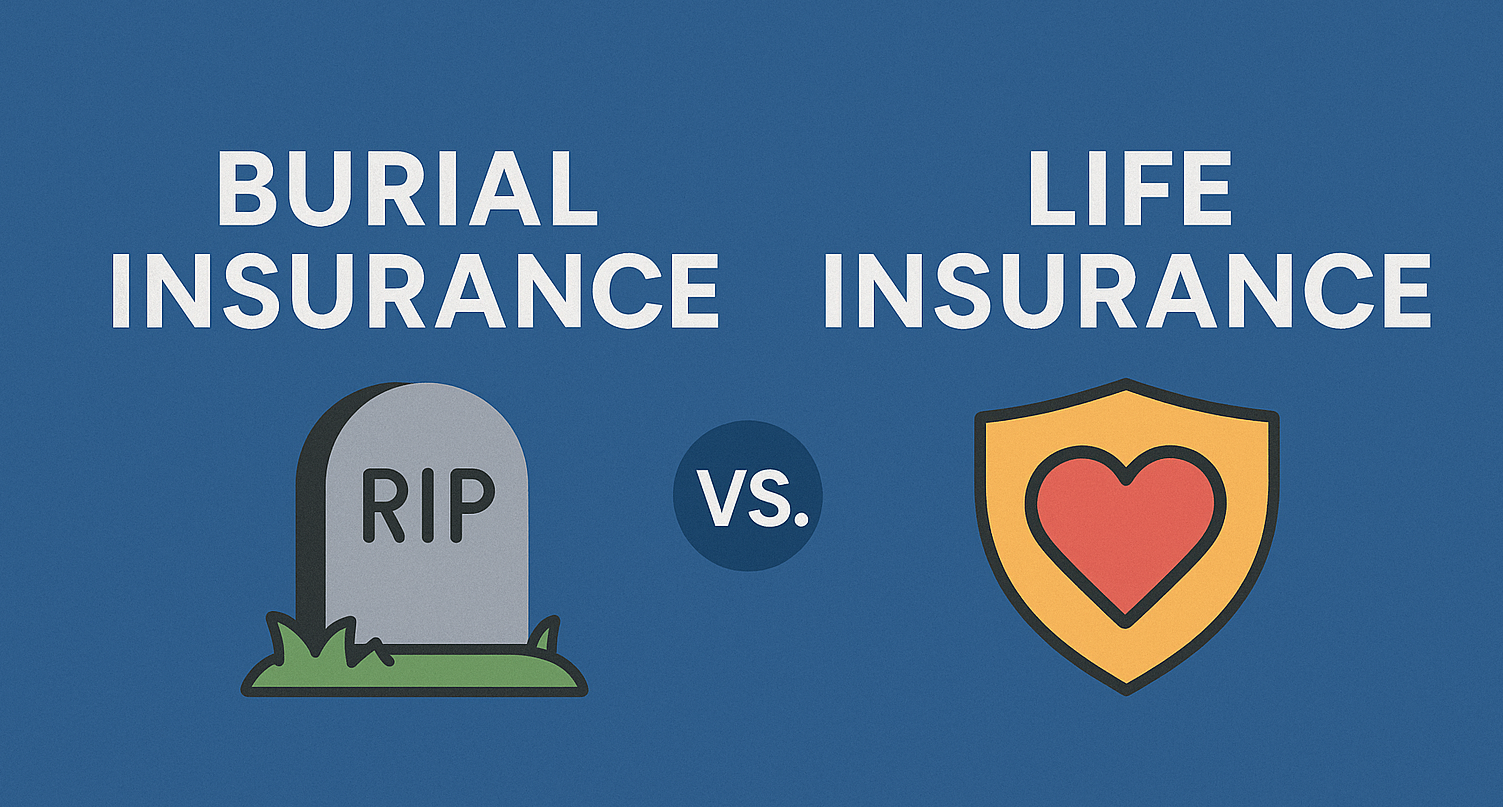If you're reading this, you probably just started looking into (or thinking about) insurance options, and you're probably wondering what the difference is between burial insurance and life insurance.
Trust me, you're not alone—I get this question constantly from families I work with.
Here's the thing: most people think they're basically the same product with different names. They're absolutely not. And choosing the wrong one can leave your family scrambling (or overpaying by thousands).
So, let me break this down for you in plain English, so you can make the right choice for your situation.
Policy Breakdown: See What You Actually Get
Compare real policy features side-by-side
What Works Well
- Easy application process
- Accepts most health conditions
- Lower monthly payments
- Perfect amount for funeral costs
- No medical exam needed
Limitations
- Small coverage amounts only
- Won't replace your income
- Some have 2-year waiting periods
- May not cover other debts
- Limited to final expenses
What Works Well
- High coverage amounts available
- Replaces lost income for family
- No waiting period for payouts
- Covers major expenses (mortgage, etc.)
- Some types build cash value
Limitations
- Much higher monthly costs
- Medical exam usually required
- Strict health requirements
- Longer approval process
- Can be denied for health issues
What Is Burial Insurance? (The Simple Version)
Think of burial insurance as insurance with one job: covering your final expenses. That's it. Here's what you need to know:
- Coverage amounts: Usually $5,000 to $25,000 (enough for a funeral, not much else)
- Super easy to qualify: Most companies accept you even with health issues
- Fast approval: Often get approved in minutes, not weeks
- Lower premiums: Way cheaper than traditional life insurance
- One purpose: Covers funeral, burial, cremation, and maybe some leftover debt
The whole point is to make sure your family doesn't get stuck with a $10,000+ funeral bill when you're gone. It's not about leaving them rich—it's about not leaving them broke.
What Is Life Insurance? (Beyond the Basics)
Life insurance is the heavyweight champion of the insurance world. It's designed to replace your income and support your family long-term. Here's the deal:
- Coverage amounts: Can be $50,000, $500,000, or even millions
- Stricter qualifying: They want medical exams, blood work, the whole nine yards
- Takes time: Approval can take weeks or months
- Higher premiums: You'll pay significantly more monthly
- Multiple purposes: Replaces income, pays off mortgage, funds kids' college, covers final expenses
This is what you get when you want to make sure your family maintains their lifestyle after you're gone. It's financial protection on steroids.
5 Signs You Need Burial Insurance (Not Life Insurance)
1. You're mainly worried about funeral costs
If your biggest concern is making sure your family doesn't get hit with funeral expenses, burial insurance is your answer.
2. You're over 50 with health issues
Traditional life insurance companies can be picky. Burial insurance companies? Much more forgiving.
3. You want something simple and fast
No medical exams, no waiting around for months. Apply today, get covered tomorrow.
4. You're on a tight budget
Burial insurance premiums are typically $20-$50 per month. Life insurance can easily be $100+ for decent coverage.
5. Your family is financially stable
If your spouse has their own income and retirement savings, they might not need income replacement—just help with final expenses.
3 Situations Where Life Insurance Wins Every Time
1. You're the primary breadwinner
If your family depends on your income to pay the mortgage, buy groceries, and keep the lights on, burial insurance won't cut it. You need life insurance.
2. You're young and healthy
Life insurance is cheap when you're young and healthy. A 30-year-old can get $500,000 in coverage for like $30/month. That's a no-brainer.
3. You have big financial obligations
Mortgage, kids heading to college, business loans—if you've got major financial responsibilities, you need major coverage.
The Bottom Line: Don't Overthink This
Here's my take after helping hundreds of families: most people over 50 who are just worried about funeral costs should go with burial insurance. It's simple, affordable, and does exactly what it's supposed to do.
But if you're younger, supporting a family, or have significant financial obligations, life insurance is the way to go.
Still not sure? Here's what I tell everyone: think about what would happen to your family financially if you died tomorrow. If they'd struggle to pay bills and maintain their lifestyle, get life insurance. If they'd be okay financially but just need help with funeral costs, burial insurance is perfect.
Ready to get a quote? Most burial insurance companies let you compare rates online in about 2 minutes. No medical exam required, and you'll know exactly what you'll pay before you commit to anything.
Get Your Personalized Quote Today
Want help figuring out which option is right for your specific situation? Get a free quote and see exactly what you'll pay.
Get My Free QuoteHi, I'm Matt 👋🏻 You're probably wondering why a friendly-looking guy like me is running a blog about one of the darkest topics out there. Totally fair. I got into this industry the weird way: nursing school ➝ hospice volunteer ➝ assistant funeral director. After helping families through some of the hardest moments of their lives, I realized most people have no idea where to start. So, that's why I created EOL Advisor—to share what I've learned and make this stuff way less overwhelming.
.png)







